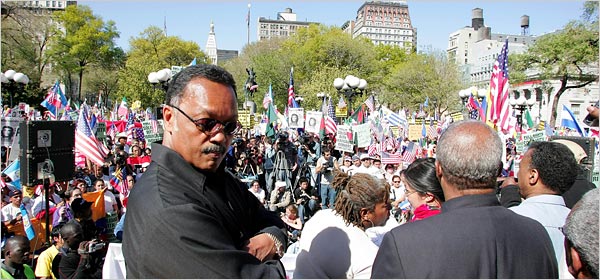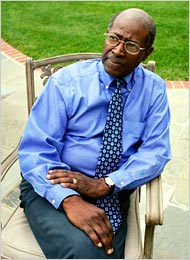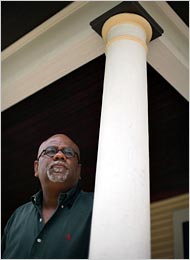| @wehaitians.com | |
No one writes to the tyrants | |
HistoryHeads/Not Just Fade Away |
| Correspond with us, including our executive editor, professor Yves A. Isidor, via electronic mail: |
| letters@wehaitians.com |
| Want to send this page or a link to a friend? Click on mail at the top of this window. |
|
 |
|
| Posted Friday, May 5, 2006 |
GROWING UNEASE FOR SOME BLACKS ON IMMIGRATION |
 |
Uli Seit for The New York Times |
| The Rev. Jesse Jackson on Monday at a rally in New York. |
By RACHEL L. SWARNS |
WASHINGTON, May 3 — In their demonstrations across the country, some Hispanic immigrants have compared the Rev. Dr. Martin Luther King Jr.'s struggle to their own, singing "We Shall Overcome" and declaring a new civil rights movement to win citizenship for millions of illegal immigrants.
Civil rights stalwarts like the Rev. Jesse Jackson; Representative John Lewis, Democrat of Georgia; Julian Bond and the Rev. Joseph E. Lowery have hailed the recent protests as the natural progression of their movement in the 1960's.
But despite some sympathy for the nation's illegal immigrants, many black professionals, academics and blue-collar workers feel increasingly uneasy as they watch Hispanics flex their political muscle while assuming the mantle of a seminal black struggle for justice.
Some blacks bristle at the comparison between the civil rights movement and the immigrant demonstrations, pointing out that black protesters in the 1960's were American citizens and had endured centuries of enslavement, rapes, lynchings and discrimination before they started marching.
Others worry about the plight of low-skilled black workers, who sometimes compete with immigrants for entry-level jobs. And some fear the unfinished business of the civil rights movement will fall to the wayside as America turns its attention to a newly energized Hispanic minority with growing political and economic clout.
"All of this has made me start thinking, 'What's going to happen to African-Americans?' " said Brendon L. Laster, 32, a black fund-raiser at Howard University here, who has been watching the marches. "What's going to happen to our unfinished agenda?"
Mr. Laster is dapper and cosmopolitan, a part-time professor and Democratic activist who drinks and dines with a wide circle of black, white and Hispanic friends. He said he marveled at first as the images of cheering, flag-waving immigrants flickered across his television screen. But as some demonstrators proclaimed a new civil rights movement, he grew uncomfortable.
 |
 |
||
Doug Mills for The New York Times |
Mark Kegans for The New York Times |
||
| Ronald Walters and earlier blacks had opposed immigration. | Some blacks are uneasy about immigrants taking on the mantle of the civil rights era, John R. Campbell Jr. says blacks and Hispanics should be united |
He says that immigrant protesters who claim the legacy of Dr. King and Rosa Parks are going too far. And he has begun to worry about the impact that the emerging immigrant activism will have on black Americans, many of whom still face poverty, high rates of unemployment and discrimination in the workplace.
"I think what they were able to do, the level of organization they were able to pull off, that was phenomenal," said Mr. Laster, who is also a part-time sociology professor at a community college in Baltimore. "But I do think their struggle is, in fundamental ways, very different from ours. We didn't chose to come here; we came here as slaves. And we were denied, even though we were legal citizens, our basic rights."
"There are still a lot of unresolved issues from the civil rights era," he said. "Perhaps we're going to be pushed to the back burner."
This painful debate is bubbling up in church halls and classrooms, on call-in radio programs and across dining room tables. Some blacks prefer to discuss the issue privately for fear of alienating their Hispanic allies. But others are publicly airing their misgivings, saying they are too worried to stay silent.
"We will have no power, no clout," warned Linda Carter-Lewis, 62, a human resources manager and the branch president of the N.A.A.C.P. in Des Moines. "That's where I see this immigrant movement going. Even though so many thousands and thousands of them have no legal status and no right to vote right now, that day is coming."
Immigrant leaders defend their use of civil rights language, saying strong parallels exist between the two struggles. And they argue that their movement will ultimately become a powerful vehicle to fight for the rights of all American workers, regardless of national origin.
"African-Americans during the civil rights movement were in search of the American dream and that's what our movement is trying to achieve for our community," said Jaime Contreras, president of the National Capital Immigration Coalition, which organized the April 10 demonstration that drew tens of thousands of people to Washington.
"We face the same issues even if we speak different languages," said Mr. Contreras, who is from El Salvador and listens to Dr. King's speeches for inspiration.
Mr. Jackson, who addressed the immigrant rally on Monday in New York, echoed those views. He noted that Dr. King, at the end of his life, focused on improving economic conditions for all Americans, regardless of race. And he said the similarities between African-Americans and illegal immigrants were too powerful to ignore.
"We too were denied citizenship," Mr. Jackson said. "We too were undocumented workers working without wages, without benefits, without the vote. "We should feel honored that other people are using tactics and strategies from our struggle. We shouldn't say they're stealing from us. They're learning from us."
Mr. Jackson said corporate employers were fueling the tensions between blacks and immigrants by refusing to pay a living wage to all workers. John Campbell, a black steel worker and labor activist from Iowa, agreed.
"This is a class issue," said Mr. Campbell, who has been disheartened by black critics of the immigrant marches. "We need to join forces. We can't improve our lot in life as African-Americans by suppressing the rights of anyone else."
But blacks and immigrants have long had a history of uneasy relations in the United States.
W.E.B. DuBois, a founder of the N.A.A.C.P., and other prominent black leaders worried that immigrants would displace blacks in the workplace. Ronald Walters, director of the African-American Leadership Institute at the University of Maryland, said blacks cheered when the government restricted Asian immigration to the United States after World War I. And many Europeans who came to this country discriminated against blacks.
Blacks and Hispanics have also been allies. In the 1960's, Dr. King and Cesar Chavez, the Mexican-American farm labor leader, corresponded with each other. And when Mr. Chavez was jailed, Dr. King's widow, Coretta Scott King, visited him in jail, Mr. Walters said. In recent years, blacks and Hispanics have been influential partners in the Democratic Party.
A recent poll conducted by the Pew Hispanic Center captured the ambivalence among blacks over immigration. Nearly 80 percent said immigrants from Latin American work very hard and have strong family values.
But nearly twice as many blacks as whites said that they or a family member had lost a job, or not gotten a job, because an employer hired an immigrant worker. Blacks were also more likely than whites to feel that immigrants take jobs away from American citizens.
Mr. Walters said he understood those conflicting emotions, saying he feels torn himself because of his concerns about the competition between immigrants and low-skilled black men for jobs. In 2004, 72 percent of black male high school dropouts in their 20's were jobless, compared with 34 percent of white and 19 percent of Hispanic dropouts.
"I applaud them moving out of the shadows and into the light because of the human rights issues involved," Mr. Walters said of illegal immigrants. "I've given my entire life to issues of social justice as an activist and an academic. In that sense, I'm with them.
"But they also represent a powerful ingredient to the perpetuation of our struggle," he said. "We have a problem where half of black males are unemployed in several cities. I can't ignore that and simply be my old progressive self and say it's not an issue. It is an issue."
Copyright 2006 The New York Times Company. Reprinted from The New York Times, National, of Thursday, May 4, 2006.
| Wehaitians.com, the scholarly journal of democracy and human rights |
| More from wehaitians.com |